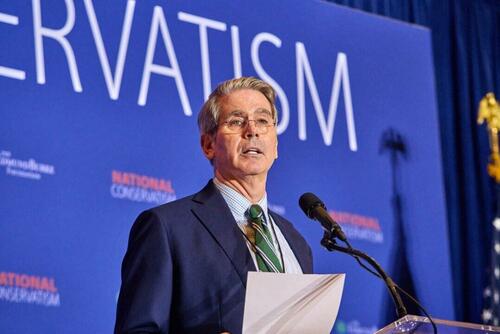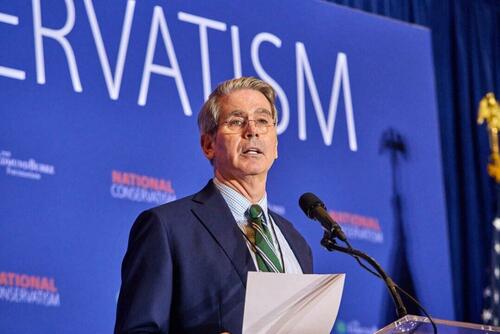A Note Of Caution For Those Who View Bessent As A Return To Orthodoxy
By Benjamin Picton, Senior Macro Strategist at Rabobank
Bessent Into Orthodoxy?
Markets extended recent gains yesterday in apparent reaction to Donald Trump’s decision to nominate hedge fund manager Scott Bessent as Treasury Secretary. The S&P500 closed 0.30% higher at 5987, the DOW gained almost 1% to close at 44,736 and the NASDAQ was up 0.27% to 19,055. The EuroStoxx 50 rose 0.23%, the FTSE100 was up 0.36% and the ASX200 gained 0.28% to close at a fresh all-time high of 8,417.
The Treasury curve bull flattened as 2-year yields fell 10.4bps to 4.27% and 10-year yields dropped by 12.7bps to 4.27%. As you have no-doubt deduced, this means that the 2s10s Treasury spread is now completely flat and poised to drift back into inversion if the recent flattening momentum continues. Curiously, this puts us back into a similar position as the one that prevailed immediately before the FOMC cut the Fed Funds rate by 50bps on September 18th. RaboResearch views this as a short-term cyclical move and our expectation for longer-term bear-steepening of the Treasury curve remains.
The Bloomberg Dollar Spot Index was 0.61% lower on the day as EUR, JPY and GBP all squeezed out gains. High-beta currencies like the AUD, NZD and CAD were notable laggards, with the Loonie actually losing ground against the big Dollar. The Loonie is falling further this morning after Donald Trump suggested that he would impose tariffs of 25% on all products from Canada and Mexico. The EUR, AUD and NZD are also being heavily offered in early trade.
The relative underperformance in CAD and AUD yesterday might have had something to do with the sharp fall in energy prices that accompanied rumours that Israel and Hezbollah are poised to agree a ceasefire deal in Lebanon. The intuition behind this move being that a pause in hostilities between Israel and Iran’s favourite proxy perhaps lessens the probability of escalation against Iran itself, which might have impacted oil supplies flowing out of the Hormuz Strait. Brent crude fell 2.69% to $73.15/bbl.
The appointment of Bessent might have also had some influence on energy prices. Markets are clearly breathing a sigh of relief at the nomination of a Wall Street insider who has a CV that includes a stint working for George Soros when the latter famously “broke the Bank of England” by shorting Sterling against the Deutsche Mark in the 1990s. More than a few commentators are suggesting that Bessent might act as a “voice of reason” within the Trump cabinet, and act to temper some of the more hawkish policy predilections of the Administration. Bessent has previously indicated his support of policies to substantially expand US oil production and cut the fiscal deficit, which would be disinflationary on both the supply and demand side.
Aside from a long career as a successful macro fund manager, Bessent has also lectured in economic history at Yale and, as reported in the Wall Street Journal, wants to be involved in the “grand global economic reordering” that he sees taking place. Perhaps contrary to the narrative implied by the price action yesterday, Bessent is not opposed to the use of tariffs and his advocacy for the appointment of a ‘Shadow Fed Chair’ as a form of forward guidance (initiated by executive government) suggests that he is open to policy actions that would curtail the independence of the Fed and give the President more control over the full suite of economic policy levers.
This might sound familiar to regular readers of this publication. RaboResearch’s Global Strategist, Michael Every, has written extensively since 2016 on the re-ordering of the global economy and the re-emergence of Great Power competition.
The reform of institutional settings adopted during the unipolar period of increased trade liberalization and globalization to better support state aims is a logical consequence of a paradigm shift in the way that the global system works. A more mercantilist approach that favors state aims and control of strategic supply chains over efficiency of production and low inflation implies a different infrastructure of government to what currently prevails.
As a student of economic history, Bessent seems to understand this. Perhaps that should raise a note of caution for market participants hurriedly interpreting the appointment of a “Wall Street insider” as a step back towards the orthodoxy of the last 30 years.
Tyler Durden
Tue, 11/26/2024 – 10:45


